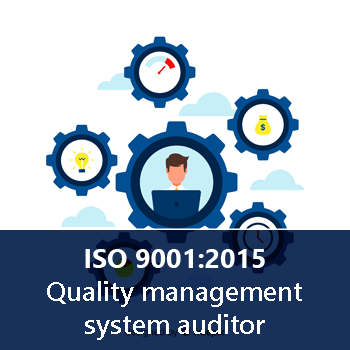The key benefits of becoming an ISO 9001 certified auditor
Published on May 21, 2023
-(1).jpg)
Auditing is an essential component of this system, ensuring the consistent implementation of the standard. The role of an ISO 9001 auditor is to assess a company's QMS, ensuring that it complies with the principles of the ISO 9001 standard. This article explores the compelling benefits that accrue to individuals who take the path of becoming certified ISO 9001 auditors.
1. Enhanced career prospects
First and foremost, ISO 9001 auditor certification significantly enhances an individual's career prospects. This qualification is recognized globally and respected across many industries, setting certified auditors apart in the job market. Certified auditors often have a broader range of opportunities open to them, from working in consultancy firms to large multinational corporations. Additionally, the certification can also lead to higher remuneration due to the value it brings to an organization.
2. A demonstrated commitment to quality
By achieving ISO 9001 auditor certification, individuals demonstrate their commitment to quality assurance, a critical factor in any business setting. Organizations value this commitment, as it signals an understanding of the significance of maintaining and improving the quality of products and services. This dedication often translates into better job performance, helping businesses deliver superior customer value and foster increased customer satisfaction.
3. Acquisition of a valuable skill set
The journey to becoming a certified ISO 9001 auditor involves rigorous training that equips individuals with a robust skill set. These skills include knowledge of quality management principles, risk management, and understanding how to conduct audits effectively. This knowledge is transferable across different industries, which makes a certified ISO 9001 auditor an invaluable asset to any organization.
4. Increased efficiency in auditing roles
Certified auditors understand the ISO 9001 standard profoundly and are adept at identifying gaps and areas of non-compliance in a QMS. This expertise allows them to conduct more efficient and effective audits, helping businesses improve their operations and, ultimately, their bottom line.
5. Ability to facilitate continual improvement
ISO 9001 is built around the concept of continual improvement. Certified auditors are trained to identify opportunities for improvement and recommend actions that can enhance efficiency, improve performance, and reduce waste. As such, they play a vital role in driving the business towards its objectives, further enhancing its competitiveness in the marketplace.
6. Building stakeholder confidence
By becoming a certified ISO 9001 auditor, individuals can help build stakeholder confidence. They provide an unbiased assurance that a company's QMS complies with internationally recognized standards. This certification often leads to increased trust from customers, suppliers, and stakeholders, which can result in better business relationships and more opportunities.
Conclusion
The ISO 9001 auditor certification provides a wealth of benefits to individuals. Besides enhancing their career prospects, it arms them with a comprehensive understanding of quality management systems and the principles that underpin them. They can drive continual improvement, boost stakeholder confidence, and facilitate efficient audits, among other benefits. Becoming a certified ISO 9001 auditor, therefore, can provide a significant boost to an individual's career while making a substantial contribution to any organization's pursuit of quality.
